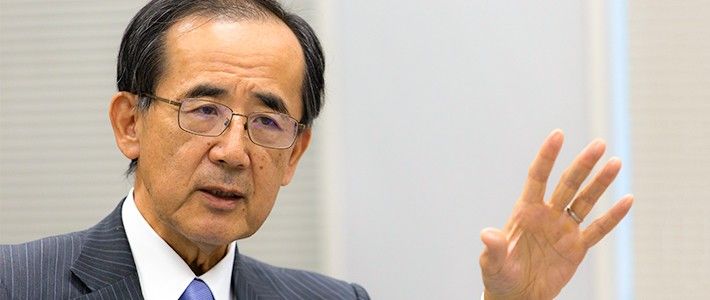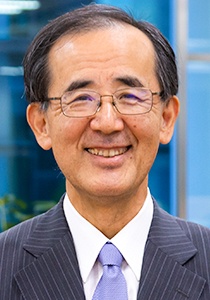
The Limits of Monetary Easing: An Interview with Ex–BOJ Governor Shirakawa Masaaki
Economy- English
- 日本語
- 简体字
- 繁體字
- Français
- Español
- العربية
- Русский
Is a Weaker Yen Better?
INTERVIEWER In your recent book describing your years at the Bank of Japan, you speak at length about the link between monetary policy and the exchange rate—a topic, perhaps, that you couldn’t comment on freely as a central banker. What were your thoughts regarding the impact of the yen’s value on the Japanese economy?
SHIRAKAWA MASAAKI I was vigilantly aware of how the exchange rate was affecting Japan’s economy. But I also knew that the value of a currency is determined by a variety of underlying economic and monetary factors, so I felt it was inappropriate to talk about the rate as if it were an independent variable. After all, there wasn’t much we could do, with Japan’s short-term interest already at zero and long-term rates among the lowest in the world. Monetary easing would not have narrowed the interest rate differential with other countries. This is a point that’s still misunderstood. People still believe that the Bank of Japan can lower the value of the yen simply through monetary easing.
When I was governor, the BOJ’s policies were maligned for accelerating Japan’s “hollowing out” of manufacturers, as they shifted production offshore in the face of a strong yen. Such criticism, though, ignores the reality that when foreign economies are growing more rapidly, companies naturally choose to produce near the place of consumption. The exchange rate affects the timing of such a shift but doesn’t dictate it. A more fundamental reason is the gap in the growth rate between the domestic and overseas economies.
Many are quick to point to the ills of an excessively strong yen, but few recognize the harm that an overly weak currency can cause. The yen’s depreciation from 2004 to 2007 is a case in point—a period when many machinery manufacturers and carmakers relocated their plants back to Japan. But in hindsight, this deprived Japanese companies of a precious opportunity to strengthen their international presence. It also burdened them with excess capacity domestically when the yen’s devaluation entered a phase of correction.
One reason for the aversion to a strong yen is that exporters tend to have a much bigger voice than the import industry in Japan. Logic dictates that there should be as many beneficiaries and proponents of a strong yen as a weak one; but while the former are a disparate group of small importers, the latter are a handful of large firms that can more effectively communicate the pain of the yen’s appreciation. Simply put, exporters’ voices are overrepresented.
People who work for export-oriented manufacturers might feel that a cheaper yen is to their advantage, but there are surely others, notably importers, who stand to profit when the yen is strong. As consumers, moreover, everyone would benefit when imports become cheaper. The media, which presumably reflects average public opinion, though, is wont to bemoan any signs of a rising yen. Frankly, I think this is a sort of national tragedy.
Limited Impact of Quantitative Easing
INTERVIEWER The BOJ adopted “comprehensive monetary easing” in 2010—when markets were reeling from the appreciation of the yen—pushing an expansionary monetary policy to new frontiers. At the time, the policy’s announcement was met with considerable surprise, but it soon became commonplace. Voices increasingly called for the BOJ to expand its purchase of Japanese government bonds and broaden the monetary base, as the US Federal Reserve accelerated its quantitative easing.
SHIRAKAWA The effectiveness of monetary easing derives from lowering interest rates. In that sense, is there any value in purchasing government bonds, save for the potential for keeping long-term interest low? If rates are already near zero, the impact of those operations will be severely limited. On top of that, low interest rates are essentially bringing forward future demand to the present. It doesn’t actually lead to boosting overall demand in the long run, even if it is deployed for a prolonged period of time.
Proponents of quantitative easing argued, however, that such operations would signal the BOJ’s seriousness about its intention, which in itself would drive down the yen’s value. Serious or not, we were positioned in a territory where we could not prevent the interest rate differential from narrowing. That meant that if other countries lowered their rates in the face of a slowing economy, the differential would shrink, and the yen would naturally appreciate. Even if we had followed the Fed’s lead in expanding the monetary base, it would have done nothing to weaken the yen’s value. Should global markets recover, prompting foreign monetary authorities to begin hiking their policy rates, then the widening differential would guide the yen lower.
That’s not to say that purchasing government bonds is without meaning. But when it’s linked with efforts to trigger inflation or maneuver the exchange rate at a time when Japan’s public finances are deteriorating, the BOJ may be doomed to purchase government bonds without any limit. This is a condition known as “fiscal dominance,” when monetary policy becomes hostage to mounting public debt, preventing the central bank from focusing on macroeconomic and financial stability. Since I was concerned about this, I was very careful about the logic of monetary policy to be used.
INTERVIEWER Why is there so little understanding about the dangers of fiscal dominance among politicians and the general public?
SHIRAKAWA I wouldn’t say there’s lack of understanding. I think most people realize—at least at the gut level—that it’s not healthy for a country’s monetary policy to be dictated by fiscal needs. They also know that the economy isn’t going to get any better simply by the BOJ’s act of purchasing government bonds.
But with so many politicians, economists, and media commentators banding together to blame the lack of “boldness” of the BOJ’s policy to tackle deflation and the rising yen, public opinion will naturally be receptive to something more “aggressive.” Soon after I stepped down as BOJ governor, though, I was told by a prominent corporate CEO that arguments in favor of flooding the market with cash to jump-start the economy leave him cold. Such talk, he said, make him feel his efforts as CEO—delivering better products and services—was negated. My hunch is that many hardworking corporate managers would share his reaction.
Efforts Toward Fiscal Sustainability
INTERVIEWER While you were governor, the BOJ’S “passive policy” was criticized by politicians and economists, who maintained that deflation was essentially a monetary phenomenon.
SHIRAKAWA At the time, many took it for granted that beating deflation was the economy’s number-one priority. But there was considerable confusion arising from the fact that deflation meant different things to different people. Government officials and economists defined it as a continued decline in price levels, but for people on the street, the term expressed their deepening anxieties about making ends meet. The word took on a life of its own, conjuring images of the Great Depression of the 1930s.
Complicating matters further were comments by foreign academics who didn’t have a full grasp of the problems facing the Japanese economy. They erroneously asserted that all Japan needed was a bold monetary policy to halt deflation.
I suspect most people were rather skeptical about what could be achieved with monetary easing alone, but the economists prescribing reflationary policies got so much attention that the general public began to accept what they were saying.
Today, far fewer people claim that expanding the monetary base is all you need to do to end Japan’s economic stagnation. But there are some lingering diehards who insist that even bolder measures are necessary or that monetary tools were thwarted from deep-seated deflationary mindset. On the whole, it appears that the state of the debate on the efficacy of quantitative easing or unconventional monetary easing hasn’t changed.
The reason I say that is because the link between monetary policy and exchange rates is still misunderstood, as I explained just now. The biggest factor affecting the yen’s exchange rate since summer 2012 has been global economic recovery, but this is a point that is still not fully appreciated.
INTERVIEWER What are your thoughts regarding the BOJ’s exit strategy from unconventional monetary policy?
SHIRAKAWA I’ll refrain from commenting on the bank’s current policy, but my thoughts when I was governor were that an exit strategy is not very difficult from a technical point of view; all you need to do is to raise interest on the depository institutions’ reserve balances held at the BOJ. An exit strategy was far more complicated back in 2006, when the Bank of Japan exited from quantitative easing; the practice of paying interest on those reserves had yet to begin.
The real difficulty in exiting from an unconventional policy is the impact on the market and the economy of unwinding of “positions” that various market players have staked out on the assumption that low interest would continue. In the government bond market, for example, rising interest would cause market prices to drop, adversely affecting the financial institutions that hold significant amounts of the treasuries and destabilizing the financial system. In the currency market, it would encourage a stronger yen, dampening the inflation rate. The biggest fear is the impact on long-term rates, which could increase debt servicing costs, which are now suppressed. Such concerns could tie the hands of monetary authorities and enforce the continuation of the status quo. The real problem Japan faces is the sustainability of public finances. The exit strategy that we need should not be framed in terms of a monetary policy but a fiscal one.
Monetary policy measures alone can’t fix Japan’s economic woes; of far greater importance is boosting productivity. This is actually something we knew all along, but it’s gaining renewed attention in recent years, and I think this is a good sign.
Determined Will and an Open Mind
INTERVIEWER How much authority should be bestowed on central banks by the government and the public in a democracy?
SHIRAKAWA In December 2012, an overwhelming majority of people voted into power a party that promised to achieve an inflation target of 2 percent within two years through so-called “bold monetary policy.” Again, I’m not so sure whether voters were fully conversant with what deflation means or how it can be overcome, but it is hard for a central bank to completely ignore such an outpouring of support for the policy.
The BOJ is of course not a kingdom within the state. And it’s not immune from making policy errors—just like any other central bank. But at the same time, it’s required, under the Bank of Japan Act itself, to achieve price stability and financial stability. So it has a responsibility to undertake the policies that it believes will contribute to those goals, while it keeps an open mind and acknowledges an array of viewpoints.
It’s the responsibility of the members of the BOJ Policy Board to be determined to adopt those policies that they deem are most appropriate at that particular time. There’s absolutely no room for promises with the government that could prevent Board members from exercising proper judgment in the future. So, when the BOJ issued the joint statement with the government in 2013, the basic principles of monetary policy were clearly spelled out, the most important being that the BOJ would closely monitor financial imbalances such as bubbles that threaten the economy’s sustainable growth, while the government would take firm steps toward fiscal reform.
(Based on a November 15, 2018, interview in Japanese held at the Nippon.com office. Interview and text by Kuwabara Minoru of Nippon.com.)
Related Tags
Bank of Japan monetary policy yen appreciation Shirakawa Masaaki finance monetary easing




